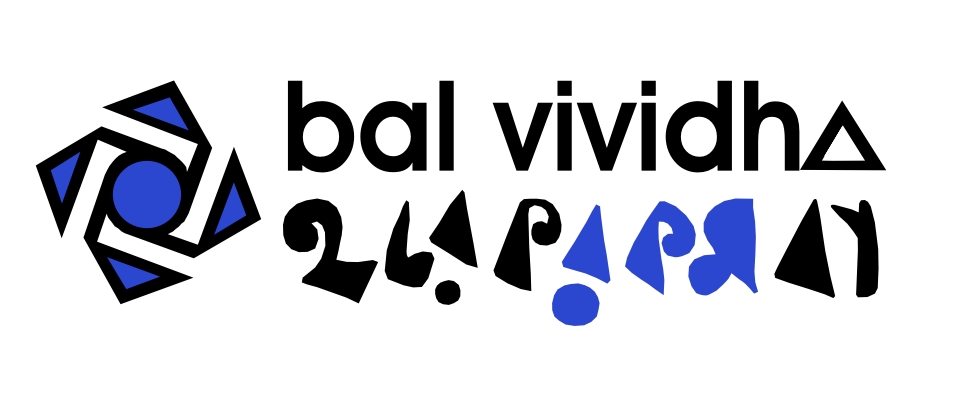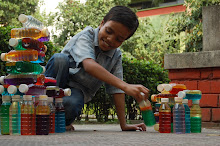Comet Media Foundation
Topiwala Municipal School, Lamington Road
Mumbai 400007, India
Tel: 91-22-2382 6674 or 2386 9052
e-mail: cometmediafdn@gmail.com
website: http://www.cometmedia.org/
Ten years and 24 rounds of bal vividha
Comet Media Foundation is a non-profit organisation based at Mumbai, active since 1985. We are involved in producing educational communication materials in print, film and video media and in holding public events that bring these elements together. The subject of our work is a range of issues related to science, technology and society. These concerns have led us to experiment with varied forms of media, from the conventional, like film, video and print publications, to evolving our own genre of educational development resource festivals called vividha.
One such festival is bal vividha, dedicated to introducing innovative approaches to education to children, teachers and parents in an interactive manner. The objective being to communicate alternative educational approaches based on experiential and constructivist pedagogies, bal vividha is a collective event of all the participants. It highlights their work and their perspectives and seeing a concentration of many interesting approaches at one place gives ideas and inspiration to the festival visitors. Most of these are approaches which one can easily adapt. They are for the most part, low-cost ingenious ideas, which bring joy to children and make them think for themselves.
This is edition 24 of bal vividha, and we are happy to say that this winter we are completing a decade of bal vividhas, having started on Children's Day of 1998. It has been a privilege for us to do the necessary networking and fund raising to put bal vividha together. In the course of it, we meet the most interesting people and come to know of their efforts in education. We are thrilled to return for our third bal vividha in Kolkata this year, following earlier editions in 2006 and 2007.
We are grateful to our partners, the Birla Industrial and Technological Museum of the Government of India for co-hosting this event for three years. Our Kolkata coordinator Subha Das Mollick and the team, many of whom are participating in it for the second and third time, must be commended for their steadfastness. They have created this wonderful event with barely any infrastructure, their temporary office being situated inside their mobile phones and e-mail accounts. We also express our thanks to the organising committee, who have been generous in supporting the team's efforts with suggestions and material contributions, giving us a tremendous sense of security.
Despite in the potential for chaos with so many collaborators, the Kolkata bal vividha event has built itself through the combined experience of all these dedicated people and has acquired its own regional flavour and following of people who contribute, participate and visit repeatedly every year.
Since 2005, Comet as an organisation has been drawn to increasingly the ubiquitous Information Communication Technologies (ICTs), based on our activities over the past many years. ICTs represent the possibility that everyone with access to the tools can become a participating learner and get access to vast reserves of knowledge. This is a particularly exciting prospect in a society where adequate libraries and laboratories do not exist in most communities and institutions.
Apart from the educational communication aspect, computers and the Internet provide scope for collaborative learning. Learners can become communicators, putting across their thoughts and experiences to the world. This opens up a new channel for teachers, NGO workers, artists, lawyers and others involved in public activities -- to produce and disseminate their own content instead of waiting for “professional” communicators such as journalists or film makers to do it for them or media such as newspapers or TV channels to reach their content to the public.
Yet there is a troubling paradox: while national and international policy supports the proliferation of ICTs (for governance, health, education, area resource mapping and other such beneficial applications), the widespread understanding of technology by decision makers and implementers is equipment-centred. It is based on an idea of education as an object sanctioned by authority and to be parroted by the recipients. Comet's objective is quite the opposite: creativity, critical thinking, democratic discourse and the opening of entrepreneurial avenues. It is not merely about installing machines and training people to operate them, but about being able to pull them apart and do new things with them. As we explored further, we realised that the potential for creativity in the ICT area cannot be realised if the playing field is restricted by copyrights and so we were drawn to the free software movement, from which we have drawn resources for our ICT or New Media work.
In the past year we have continued to conduct skill-building workshops with practitioners from various areas of social activism such as human rights, women's rights, environmental activism, as well as HIV-positive self-help groups, school teachers and disabled people, to build curricular materials and a base of experience and contacts with would-be participant organisations for an institute called COSMOS which we propose to start.
We are also very happy that one of our initiatives of exposing school children and teachers to ICTs in West Bengal has also been realised and a series of popular lectures is being organised by BITM (with help from Comet) as part of the science camps to be held in their Kolkata campus for the districts of Bardhaman, Purulia, Digha and Siliguri. This venture is being supported by the Dept. of Science and Technology of the West Bengal Government. The resource people will be highlighting the use of ICTs in the teaching learning process, emphasising the possibilities of learning in one's own mother tongue, and introducing free software to the educational community. The programme has already started in Kolkata in November 2008 and can be considered one of the fruits of the bal vividha initiative.
We are keen to hear from interested people who would like to collaborate or share their thoughts with us in both the movement to take ICTs based on free software into the hands of teachers and students and in holding festivals celebrating joyful learning and liberation from the burdens of education by rote. Please visit us at http://www.cometmedia.org/ and drop us a line at cometmediafdn@gmail.com.
Chandita Mukherjee, Director, Comet Media Foundation
Sunday, August 23, 2009
Subscribe to:
Post Comments (Atom)



No comments:
Post a Comment